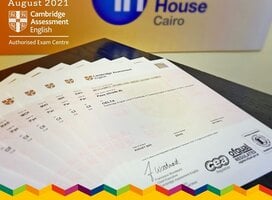Teach English in Egypt
What do the pyramids of Giza, hieroglyphics, Pharaoh Hatshepsut, and Cleopatra have in common? They’re all Egyptian! With some of the longest and most intricate stories in history, Egypt is an amazing country to teach abroad in. While its dynamic culture and history has placed it at the top of travelers’ wish lists, the country has recently undergone some tumultuous political revolution and unrest. In the midst of an unstable political period, Egypt’s public education system took a step back. Now’s the time to go teach abroad in Egypt and help children learn about the world beyond the borders of northeast Africa.
In order to teach English in Egypt, most teachers will require a teaching degree or certification such as TEFL, and at least two years of prior experience. The average salary for teaching in Egypt is $2,000 - $2,700 per month.
The Egyptian Ministry of Education recently reviewed its public education system and determined that many teachers were under qualified. Since many teachers are undergoing university education programs, there is an increased demand for foreign teachers to assist with teaching. The country also launched the New Schools Program in an effort to improve the public education system, but there tends to be a greater call for local teachers to fill these new openings.
Government/Public Schools: Public schools in Egypt are divided into local Arabic schools and experimental schools. Both utilize the Egyptian curriculum, but Arabic schools only teach lessons in Arabic. The Ministry of Education is currently working to reform the public school system, which has recently come under intense scrutiny for the poor quality of education offered. Most teach abroad opportunities in Egypt will not be at a public Egyptian school.
Private Language Academies/National Institutions: Most private language schools focus on teaching the government curriculum in English. National Institutions Schools are connected to a national institution or administration, and have tuitions that are close to private school fees. While they are not officially private schools, National Institution schools operate as if they were privately owned. The number of teaching opportunities in these types of institutions may vary depending on whether teach abroad program providers have established relations with the educational organization.
Private International Schools: International private schools follow another country’s education curriculum—usually the American, British, or French system. While the schools’ internal processes and curriculum development are not related to that of the Egyptian public school system, degrees are ultimately certified by the Egyptian Ministry of Education. Since international schools are run privately, it may be easier to land a teaching job, so the teaching expectations from one institution to another may vary.
When and Where to Look for Jobs:
There are several programs that offer TEFL training and certification in Egypt, as well as others that provide direct teaching placements. The best way to look for teaching opportunities is through a third party program provider that has already established relations with local Egyptian schools. Pay attention to the qualifications that you may need before applying to these programs.
Qualifications:
Many internship programs provide TEFL training and certification courses on location in Egypt. Some teaching placements will require teachers to have an education degree as well as minimal teaching experience. If you are looking to teach at a government sponsored program or public school, the Egyptian Ministry of Education requires teachers to take part in international professional training programs or complete 4 years of pre-service courses at an university. However, it is unlikely that you will apply for a teaching position through the Ministry of Education, as there may be a more complicated political and administrative process to follow through.
- Monthly average salary: 5000-8000 EGP
- Average hourly rate for private lessons: 200-250 EGP
Average Salary in Egypt:
The average salary of a teacher in Egypt varies greatly depending on the school’s standards as well as whether you are hired locally or through an international third party organization. Local teachers tend to be paid much less than teachers at private international schools, and some teach abroad opportunities are conducted on a volunteer basis.
Average Cost of Living in Egypt:
The average cost of living in Egypt, around 3000-6000 EGP, is much lower than that in the U.S. But like any other country, living in a more metropolitan area in Egypt will entail higher bills. You can always avoid extra costs by practicing typical cost-saving methods, including taking more public transportation, and eating in less-expensive restaurants. Below are some examples of costs for you to get a better idea of the average cost of living in Egypt. Keep in mind that the average Egyptian lives slightly above the typical foreigners’ idea of poverty and that 1 Egyptian Pound (EGP) is approximately equal to 0.15 U.S. dollars.
- 1 bedroom apartment rent: 1950 EGP
- Fast food meal: 30 EGP
- 1 way transportation ticket: 1.5 EGP
Classroom and Work Culture in Egypt:
- Student/teacher relations: Student and teacher relations in the Egyptian classroom are still very traditional and formal. Students are also expected to act formally with each other while in school, and co-ed friendships are considered unacceptable. Keep in mind that Egypt is a predominantly Muslim country, so female teachers may sometimes feel slightly less respected.
- Dress Code: Be sure to dress conservatively in the classroom. Some Egyptian schools require students to wear uniforms. Women are expected to dress even more conservatively due to the prevalence of Islamic tradition in Egyptian society. The Ministry of Education issued dress code guidelines allowing girls to wear headscarves only with a written note from parents.
- Greetings: When a teacher walks into the classroom, all students will stand and greet him/her. Students usually call teachers with a title followed by the teacher’s first name—for example Mr. David.























